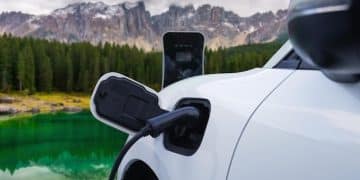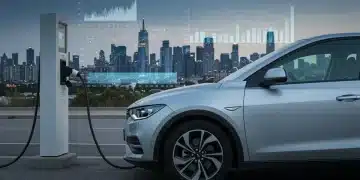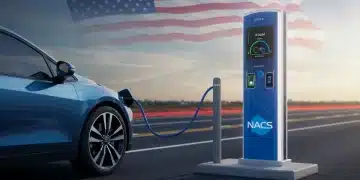Solid-State Batteries: Doubling EV Range by Late 2025?
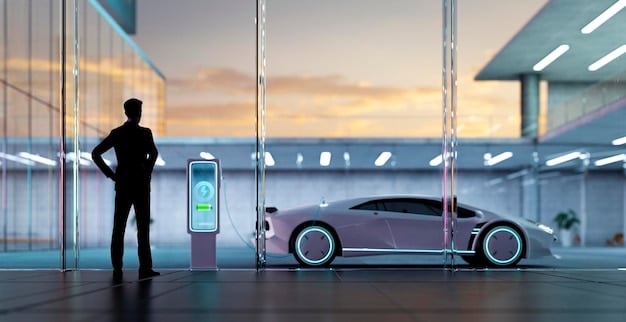
Electric Vehicle Range Anxiety Solved? Solid-state battery technology promises to revolutionize the EV industry by potentially doubling the range of electric vehicles by late 2025, offering a significant leap towards overcoming range anxiety and enhancing overall vehicle performance.
Is Electric Vehicle Range Anxiety Solved? Solid-State Battery Technology Set to Double Electric Vehicle Range by Late 2025? The future of electric vehicles (EVs) looks brighter than ever, with advancements in battery technology poised to reshape the automotive landscape. Solid-state batteries are gaining traction as a potential game-changer, promising to alleviate one of the biggest concerns for EV adopters: range anxiety.
The Promise of Solid-State Batteries
Solid-state batteries represent a significant departure from traditional lithium-ion batteries, offering a host of advantages that could revolutionize the EV industry. With enhanced energy density, improved safety, and faster charging times, these batteries are poised to address some of the key limitations of current EV technology.
Unlike conventional lithium-ion batteries that use a liquid electrolyte, solid-state batteries utilize a solid electrolyte. This fundamental difference brings several benefits.
Increased Energy Density
One of the most attractive features of solid-state batteries is their potential for higher energy density. This means that EVs equipped with solid-state batteries could travel significantly farther on a single charge, potentially doubling the range compared to current lithium-ion batteries.
Enhanced Safety
Solid-state batteries are inherently safer than their liquid electrolyte counterparts. The solid electrolyte is non-flammable and less prone to leakage, reducing the risk of fires and thermal runaway, which have been concerns with lithium-ion batteries.

- Higher Energy Density: Enables longer driving ranges.
- Improved Safety: Reduces the risk of fires and thermal runaway.
- Faster Charging Times: Allows for quicker and more convenient recharging.
In summary, the shift to solid-state batteries promises a significant enhancement in the performance and safety of electric vehicles, marking a crucial step forward in EV technology.
Addressing Range Anxiety with New Battery Tech
Range anxiety, the fear of running out of battery power before reaching a charging station, has been a major barrier to widespread EV adoption. Solid-state batteries offer a promising solution to this concern by significantly extending the driving range of EVs.
By doubling the potential range of electric vehicles, solid-state batteries are set to eliminate range anxiety. This not only makes EVs more practical for long journeys but also broadens their appeal to a wider range of consumers.
Real-World Impact on Drivers
The impact of extended range on drivers’ daily lives is substantial. With the ability to travel longer distances without needing to recharge, EV owners can enjoy greater freedom and flexibility in their transportation choices.
Comparative Analysis: Lithium-Ion vs. Solid-State
A comparison between lithium-ion and solid-state batteries highlights the advantages of the latter in terms of range and convenience. Current lithium-ion batteries typically offer a range of 200 to 300 miles, whereas solid-state batteries could potentially double that, providing a range of 400 to 600 miles on a single charge.
Therefore, solid-state batteries are set to mitigate range anxiety by offering extended driving capabilities and greater peace of mind for EV owners.
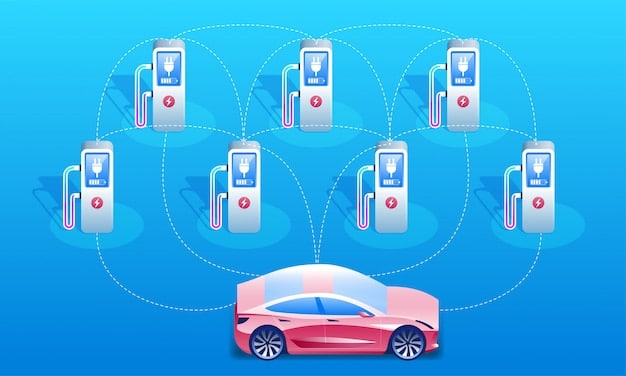
Timeline for Solid-State Battery Implementation: 2025 and Beyond
The automotive industry is gearing up for the commercialization of solid-state batteries, with many experts predicting that these batteries will begin to appear in EVs by late 2025. Several automakers and battery manufacturers are investing heavily in the development and production of solid-state batteries.
The introduction of solid-state batteries into the EV market is set to occur progressively, with more models incorporating this technology over time.
Key Players in Solid-State Battery Development
Companies like Toyota, Samsung, and QuantumScape are at the forefront of solid-state battery development. These companies are making significant investments in research and development to bring solid-state batteries to mass production.
Projected Market Penetration
Market analysts forecast that solid-state batteries will become increasingly prevalent in EVs by the late 2020s, with a substantial percentage of new EVs incorporating this technology. The exact timeline for market penetration will depend on factors such as production capacity, cost, and technological advancements.
- Toyota: Aiming to launch EVs with solid-state batteries by 2027.
- Samsung: Working on solid-state battery technology for future EVs.
- QuantumScape: Focused on developing and commercializing solid-state batteries.
In conclusion, the integration of solid-state batteries into the EV market is anticipated to escalate in the coming years, transforming the capabilities and appeal of electric vehicles.
Impact on Electric Vehicle Performance
Solid-state batteries stand to significantly enhance the overall performance of electric vehicles. In addition to extending the driving range, these batteries also offer improved charging times and better performance in extreme temperatures.
With faster charging times and improved temperature stability, solid-state batteries are set to make EVs more convenient and reliable for drivers.
Improved Charging Times
Solid-state batteries have the potential to charge much faster than traditional lithium-ion batteries. This would allow EV owners to quickly recharge their vehicles, reducing downtime and making EVs more practical for daily use.
Performance in Extreme Temperatures
Solid-state batteries are more resistant to extreme temperatures than lithium-ion batteries. This means that EVs equipped with solid-state batteries can maintain their performance in both hot and cold climates, providing a more consistent driving experience.
Thus, solid-state batteries are expected to improve the performance of EVs by enabling faster charging, better temperature stability, and enhanced overall driving dynamics.
Economic and Environmental Benefits
The shift to solid-state batteries is not just about improving the performance of electric vehicles. It also offers significant economic and environmental benefits.
By reducing reliance on rare earth materials and lowering the overall cost of battery production, solid-state batteries are able to make EVs better for both consumers and the environment.
Reduced Reliance on Rare Earth Materials
Solid-state batteries can be made with more abundant and sustainable materials, reducing the reliance on rare earth elements that are used in lithium-ion batteries. This can help to reduce the environmental impact of battery production and improve the sustainability of the EV industry.
Lower Production Costs
As solid-state battery technology matures, the production costs are expected to decrease. This can make EVs more affordable, increasing their accessibility to a broader range of consumers. Furthermore, the use of solid-state components reduces the usage of costly cooling systems and simplifies manufacturing.
- Sustainable Materials: Reduces environmental impact.
- Affordable EVs: Increases market accessibility.
- Simplified Production: Lowers manufacturing costs.
Overall, solid-state batteries are poised to have both significant economic and environmental benefits, supporting the sustainable growth of the EV industry.
Challenges and Future Directions
While solid-state batteries hold immense promise, there are challenges that need to be addressed before they can be widely adopted. These challenges include scaling up production, reducing costs, and ensuring long-term durability.
Overcoming these hurdles is crucial for realizing the full potential of solid-state batteries.
Scaling Up Production
One of the biggest challenges is scaling up the production of solid-state batteries to meet the growing demand for EVs. This requires significant investments in manufacturing infrastructure and process optimization.
Ensuring Long-Term Durability
Solid-state batteries need to be durable and reliable over the long term. This means ensuring that they can withstand repeated charging and discharging cycles without degrading significantly. Further research and development are needed to improve the durability of solid-state batteries.
In summary, while solid-state batteries exhibit tremendous potential, persistent efforts in overcoming challenges and directing future research will be essential for widespread adoption and transformative influence.
| Key Point | Brief Description |
|---|---|
| ⚡ Range Doubling | Solid-state batteries can potentially double EV range. |
| 🛡️ Enhanced Safety | Solid electrolytes reduce the risk of fires. |
| ⏱️ Faster Charging | Solid-state batteries may significantly reduce charging times. |
| 🌍 Sustainability | Reduced reliance on rare earth materials. |
Frequently Asked Questions
▼
Solid-state batteries use a solid electrolyte instead of the liquid or polymer gel found in lithium-ion batteries, allowing for higher energy density and improved safety.
▼
Solid-state batteries enhance EV range by providing higher energy density, meaning more energy can be stored in the same volume or weight compared to lithium-ion batteries.
▼
Many experts predict that solid-state batteries will begin to appear in electric vehicles by late 2025, with wider adoption expected in the following years.
▼
Yes, solid-state batteries are generally considered safer due to the non-flammable solid electrolyte, which reduces the risk of fires and thermal runaway incidents.
▼
Several major companies, including Toyota, Samsung, and QuantumScape, are actively developing solid-state battery technology for use in future electric vehicles.
Conclusion
Solid-state battery technology represents a pivotal advancement poised to redefine the landscape of electric vehicles. With the potential to double EV range, enhance safety, and improve overall performance, solid-state batteries offer a promising remedy to range anxiety and other limitations of current EV technology. As the industry progresses toward widespread adoption by late 2025 and beyond, the future of electric mobility looks increasingly bright and sustainable.
